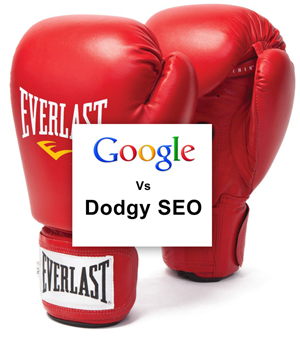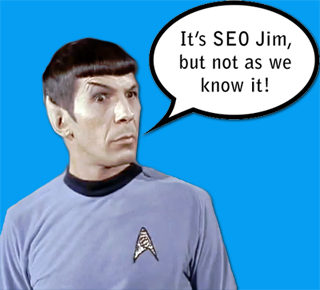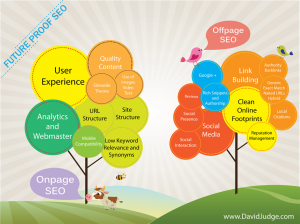How To Future Proof Your SEO

In the last couple of years Google have knocked SEO’ers around more than the last decade.
And here’s the thing … all of these nasty little updates they are doing are designed to bring their Search Engine in line with their original goal –
“Presenting the end user with the most relevant results as quickly as possible”.
All of those people out there that have always thought of SEO as a simple keyword stuffing and link building exercise are going to cease to exist.
It’s about time too! I am sick of my offline clients being bombarded by overseas companies that offer the SEO services for the price of a postage stamp without truly understanding what they need to do to assist a clients SEO success.
Not only are they making a bad name for the industry, they’re getting their clients slapped in the SERP’s every time Google do another Roll Out or update.
This translates to an industry that thinks SEO is crap!
It’s SEO Jim But Not As We Know It

We need to get back to the basics and understand what SEO actually is… SEO (or search engine optimisation) is essentially basically setting your website and your online profile up in such a way where your fully compliant to what the Search Engines want. And what do they want???
More about that later.
First I want to share how Matt Cutts (head of webspam at Google) explains SEO:
As Matt says, the job of an SEO is to look at Search Engine Optimisation more as Search Experience Optimisation where you are creating (or helping clients) create memorable sites that users want to come back to and would like to share.
This idea is waaaayyyyy different than the ideas and concepts of old school SEO (which is dying a slow painful death).
Old School SEO
Just a few years ago by using old school SEO techniques you could easily rank a site by simply doing you good old fashioned keyword stuffing and by pointing a bunch of links back to the site you wanted to rank.
Due to spammers, scammers and the changing internet Google understood this original model was not sustainable, especially if they wanted to remain the dominant leader in marketplace.
This would also mean they would need to find a way to integrate other trends like Social Buzz into account to better measure a good vs’ not so good website, hence the stronger focus on user experience.
[Insert Social] – the Facebook Billion
Sidenote…
A couple of months ago Facebook hit it’s billionth user.
Think about that for a minute.
1 / 7th of the worlds population has a Facebook account. Sure they wouldn’t all be active users, but that still a lot of people using one website.
If I were Google I would’ve been shaking in my boots, especially with Mark Zuckerberg looking at launching their own search engine in the very near future.
And what do people do when they are using Facebook? They’re interacting, they’re sharing opinions on what they like and don’t like which in turn is creating trends (also known as Social Buzz).
I love numbers and if I had access to that sort of data I would be like a pig in you know what.
Larry Page (you know the guy that started Google and is currently running it) said in an interview with CNN MONEY: “We’d like to have more of a social component in what we do.”
Welcome Google +
Many people thought Google + was designed to take on Facebook. WRONG!
Google were simply developing a way of measuring social buzz with no intention of trying to compete with Facebook. If anything what Google are doing is soooo much bigger than Facebook could ever be(for now anyway).
They are effectively buying up as many properties (online and offline) to not only future proof their business, but to capture data and trends so they can better understand what the end user wants.
Not only does this give them additional data streams to dominate, it also gave them extra ways to make money (But that in itself is another article I’ll write in the future).
Future Proofing Your SEO
What does all of this mean and how do you future proof your SEO?
Option 1 – If you think SEO is just about link building and keyword stuffing, then either shift your way of thinking or get out of the game.
Option 2 – You can approach SEO from a broader perspective, focussing more on a number of factors that come together to form the bigger picture. Not only is this an opportunity for you to future proof your SEO, but if you have offline clients it’s an opportunity for you to help them to grow a stronger overall online presence.
Breaking It Down
In my mind SEO has always been about a number of many areas that come together to form the big picture. There are certain areas that need more work than others.
To show you I’ve put together a little graphic that displays the different areas and the importance of each area.

By David JudgeFuture Proof SEO.
This puts a totally different slant of what I believe old schooled SEO’ers think they should approach SEO.
What Should You Focus On?
Although Google are totally against it, I would still say to do link building, but make sure you don’t do JUST link building.
My main point here is that SEO is (and has always been) more than link building and keyword stuffing.
For your SEO campaign to succeed you should really be focusing on:
Your On Page Optimisation (this is a big one)
Google+ and Authorship
Creating Quality Content
Engaging in Social Media
Consider User Experience (via analytics and webmaster tools)
Growing Your Reputation Management
Involvement Your Client – encourage them to be involved
If you want to succeed in SEO in the 2013 and if you haven’t already made the change then you better hurry up or you’ll be left behind.


